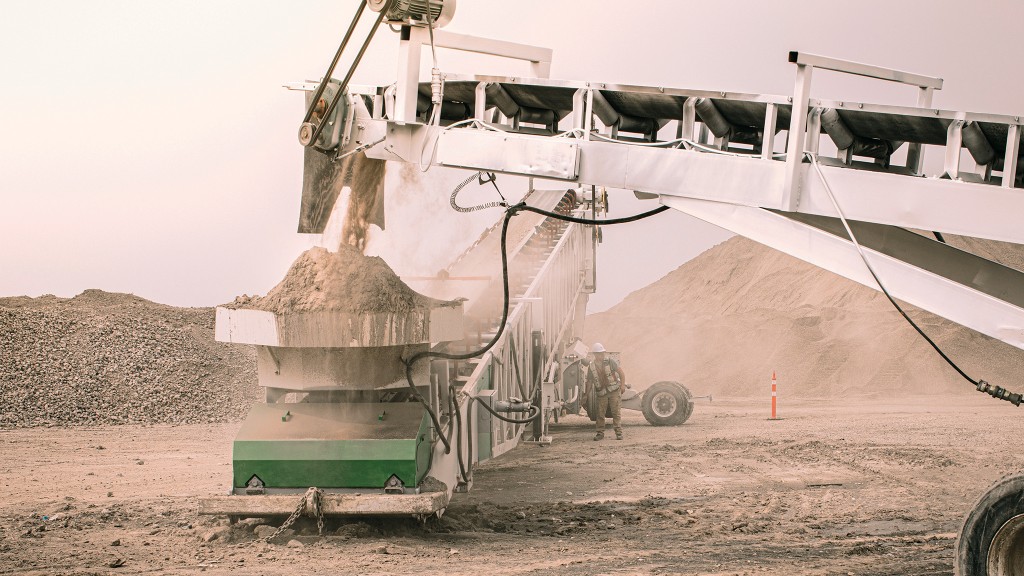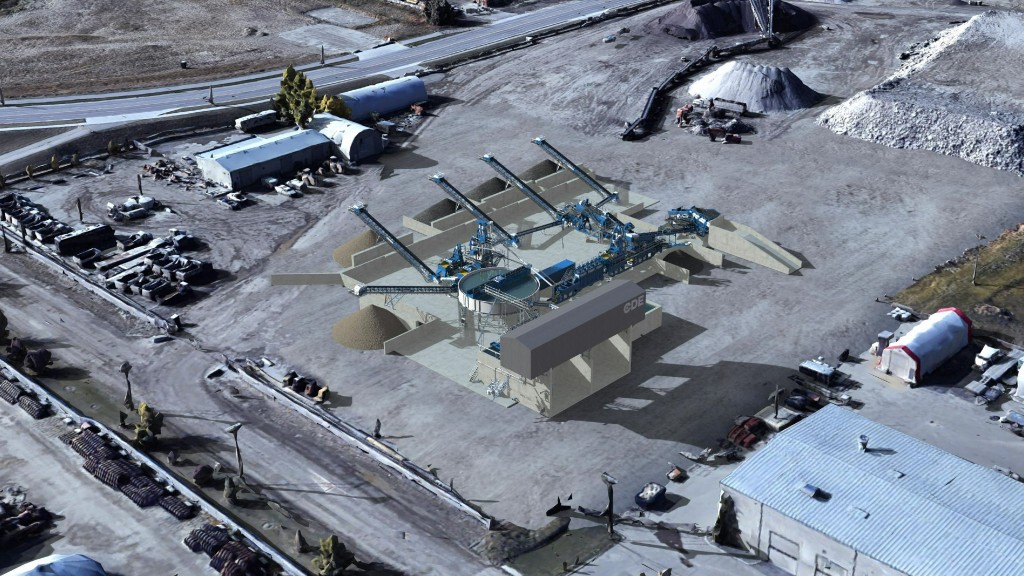Calgary C&D facility cleans up contaminated materials with new plant
A grant from Emissions Reduction Alberta helps build CDE wash plant for Calgary Aggregate Recycling

A strong construction market in the centre of Alberta has brought with it a challenge that might not be the first thing that comes to mind when starting an earthmoving project: what to do with all of that dirt, especially when you don't necessarily need it.
Even more problematic is dirt coming from urban settings, where decades of development have left their mark in the form of contamination. As developments dig deeper and create more soil that must be remediated, a need for treatment grows - but facilities that can handle that treatment are few and far between, and often these soils are just landfilled.
A Calgary company with roots in construction and aggregates is working within a provincial program to provide contractors in the region with a new alternative to handling contaminated soils. Calgary Aggregate Recycling will soon be using a new CDE-built custom plant to recycle problem soils back into the construction industry, while reducing the amount that is disposed of in landfills.
A family-owned operation for 30 years, Calgary Aggregate Recycling was purchased in 2018 by KLS Earthworks and Environmental, itself an Indigenous-led company. KLS and CAR President Travis Powell, who owns the companies along with his brother Chris, said it was an opportunity to gain a long history of customers and reputation, while also giving his contracting firm a way to recycle its own aggregate waste.
"We've started crushing gravel from various excavations around the greater Calgary area. If we run into pit run material, we take it to Calgary Aggregate, crush it, and turn it into gravel," he said. "Rather than using that as fill now, we use it as high-value aggregates for our construction activities."
Responsible disposal of waste a challenge
The move to purchase a recycling operation was important, as it remains a challenge to dispose of construction and demolition waste responsibly, Powell said. "It's hard to get rid of asphalt and concrete unless you recycle it. There are still people who will bury it in coulees outside of the city, but that's not something we wanted to do," he said. "I think it's a good selling feature that we can have this circular market within our own business."
There is a growing need for C&D recycling as more urban redevelopment takes place and aging infrastructure is replaced. While such recycling operations are common in Europe, the North American market is opening up to the potential.
"Cities like Calgary are, in the grand scheme of things, pretty young compared to the cities over in Europe, but we are getting older and older every day. We have to rebuild a lot of this old infrastructure consistently to keep up," Powell said. "So, we're seeing a lot more debris and a lot more roads being torn up and widened, bridges getting widened or refurbished, all of these things. It's really driving how much material we're seeing."
That urban development is also driving the need for management of contaminated soils. Cities that have been growing for decades tend to leave a footprint environmentally that lingers for many years after. Excavating for new construction atop the old can turn up all kinds of problem spots when it comes to contamination.
"There could be hydrocarbons from a gas station. Old dry cleaners were a big polluter thanks to the chemicals that leached over the last 60 or 70 years into the soil. You run into metals from old industrial activities," Powell described. "Then, also, there is just mixed soil from the past - whether there's wood, debris, or garbage mixed into the soil, we can screen that out."
That material needs to be disposed of properly, and at present the best choice for doing so is to send it to a landfill. However, that can be hit and miss for contractors in Alberta because landfills are reaching capacity and some days may not accept soils. That can cause delays and potentially create budget problems for contractors. Plus, Powell noted, landfills have been raising their tipping fees as a deterrent.
"So, now we're trucking material 300 kilometres out of the city, and again we're having huge schedule issues because a job that would normally take 10 trucks to execute is now taking 30 or 40 to get done in the same time," he said.
Grant provides opportunity to jump forward
A funding opportunity from Emissions Reduction Alberta provided a new option for Calgary Aggregate Recycling: create a way to process that material without leaving the city.
In November 2021, ERA announced $176 million for projects across Alberta that would accelerate the province's economic recovery while also supporting environmental sustainability. The Shovel-Ready Challenge was looking for new technologies that would reduce carbon emissions, and a local soil recycling and reuse facility that cut down on truckloads leaving the city every day while bolstering the local construction sector was a good fit for the program.
Taking a shot at the challenge meant planning a new plant for the facility. Powell found a good fit for the project on YouTube, of all places.
"I came across a facility in New York that CDE designed and commissioned for Posillico Materials. They had just cleaned up a whole bunch of creosote impacted soil with this facility, and an old heating oil terminal," he said. "It was similar contamination problems to what I felt the City of Calgary had."
Working with CDE, Calgary Aggregate Recycling has designed a plant that will be one of three similar operations in North America - the Posillico Materials facility, another planned for this year in Maryland, and the Calgary location. The goal will be to produce usable materials from contaminated material while reducing the volume of soils going to landfill and cutting back on truck trips for reduced emissions.
Calgary Aggregate Recycling will move sand and stone through the CDE wash plant; surface contamination will be removed by the process, and the resulting cleaned materials can be used for construction projects moving forward, Powell said.
"The contaminants will go into the water stream, which is a big closed loop water treatment facility. Through filtration, the addition of additives like flocculants, and it will all come out as a filter cake, which essentially concentrates all the contamination into about ten percent of the soil volume, rather than being spread throughout it," he explained.
Up to 600,000 tons recycled yearly
According to CDE, the plant that is scheduled to open in the fall of 2022 will be able to recycle up to 600,000 tons each year.
"We are privileged to work alongside Calgary Aggregate Recycling Inc. to deliver a major C&D waste recycling system in Canada," said Adrian Convery, CDE business development manager for Canada, said of the project. "The resulting solution will represent all that we strive for in pursuit of a circular economy, facilitating the diversion of vast tonnages of material from landfill, transforming them into high-grade recycled sand and aggregates for the construction industry, while simultaneously restoring land for future use and driving down CO2 emissions."
In the process, an estimated 22,567 tons of carbon emissions may be reduced annually - and thanks to that, ERA provided Calgary Aggregate Recycling a grant of more than $8 million to get the plant up and running. "What ERA did probably sped up our process by about five years in being able to build this facility . . . by taking some of these innovative ideas and making them employable in the market," Powell said.
"Emissions Reduction Alberta's Shovel-Ready Challenge is unlocking innovation and mobilizing private spending to create economic opportunities and improve environmental performance," said Steve MacDonald, CEO of ERA. "This investment builds on Alberta's strengths across sectors and turns emission reduction ambitions into action."
When the plant is running later this year, Powell expects to add another 9 to 12 staff members to its current team of 15. Adding the soil reuse facility to the existing C&D crushing and processing will mean continued growth moving forward.
"I think there's a lot of opportunity in this recycling space, whether it's just sticking with the soil and concrete or if there are future opportunities to process other waste streams," Powell related. "You look at some of these more progressive countries like Germany, when they demolish a building, 90 percent of that material is reused into new construction projects. I think there's a significant opportunity to handle, process, and recycle a lot of material into new products here."




